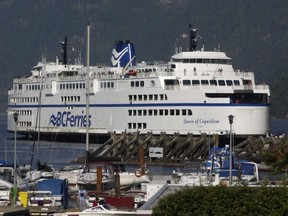Business
B.C. Ferries Defends New Ship Contract Amid National Criticism

B.C. Ferries has responded to criticism regarding its recent decision to award a contract for four new ferries to China Merchant Industry’s Weihai Shipyards. This announcement has ignited a national debate about the future of shipbuilding in Canada, particularly in relation to domestic production capabilities and workforce training. During a federal meeting on March 12, 2024, in Hamilton, Ontario, B.C. Ferries CEO Nicolas Jimenez emphasized the need for increased government support to develop a skilled workforce and enhance the domestic supply chain for shipbuilding.
The contract in question involves replacing four aging ferries, each between 53 and 65 years old, with new diesel-battery vessels. These new ferries, capable of carrying 360 cars and 2,100 passengers, are expected to be delivered between 2029 and 2031. The decision to procure these vessels from China rather than from Canadian shipyards has drawn sharp criticism from various political leaders, including federal Transportation Minister Chrystia Freeland. Freeland expressed her “great consternation and disappointment,” particularly in light of existing tensions involving tariffs imposed by China on Canadian exports such as canola and seafood.
Call for a Collaborative Approach
The meeting titled “Made In Canada” aimed to foster collaboration between government officials and industry leaders to discuss strategies for building ferry and railway projects using Canadian materials. Freeland noted the importance of ensuring that Canadian steel and aluminum are utilized to protect domestic jobs.
While Jimenez acknowledged Freeland’s sentiments, he pointed out that neither of the two Canadian shipyards that pre-qualified for the contract submitted bids. He countered criticisms from Quebec’s Davie Shipyard, which claimed the procurement process was flawed and biased towards lower costs without adequate recognition of Canadian content. Similarly, Seaspan Shipyards from North Vancouver had previously indicated that they could not compete with foreign yards due to lower labor costs and concluded that they would not participate in the bid process.
“The criticism is not entirely fair,” Jimenez stated. “They are suggesting that we can’t compete with larger yards that build ships at scale and have more advanced capabilities.” He emphasized the necessity for Canadian shipyards to enhance their competitiveness to secure fixed-price contracts with guaranteed timelines, free from political interference.
Jimenez revealed that B.C. Ferries had modified some criteria in its pre-qualification process. Changes included lowering the minimum size of vessels that a yard must have built since 2018 and incorporating a “value to Canada” factor to ensure that Canadian yards could qualify.
Although the final price of the contract has not been disclosed, Jimenez indicated that selecting a European shipyard would have added approximately $1.2 billion to the cost, a decision he deemed fiscally irresponsible. “I have a fiduciary responsibility to British Columbians, to the company, and to my board,” he added.
Future Prospects for Domestic Shipbuilding
Jimenez noted that Canadian shipyards have largely focused on contracts from the federal government to build vessels for the Royal Canadian Navy and Coast Guard, which has limited their participation in B.C. Ferries’ bidding processes over the past decade. “The lack of bids this round was primarily because Canadian yards were already occupied,” he explained. “It wouldn’t be fair for British Columbians to wait ten years for ships that could be delivered in three.”
Although no representative from Seaspan was available for comment, senior vice-president Dave Hargreaves acknowledged B.C. Ferries’ urgent need for new vessels. Hargreaves highlighted Seaspan’s capabilities in constructing large, complex ships and expressed hope for future collaborations with the province.
Looking ahead, Jimenez indicated that B.C. Ferries intends to procure at least two more larger ferries within the next two years. He also stressed the importance of a national strategy that extends beyond ferry construction, stating, “If we are only talking about ferries, we are missing the point, as we are a very small purchaser of vessels in the grand scheme.”
The ongoing discussions about Canadian shipbuilding underscore the complexities of balancing fiscal responsibility, domestic production capabilities, and the need for a skilled workforce. As B.C. Ferries moves forward, the dialogue surrounding these issues will likely continue to evolve, reflecting broader concerns about Canada’s industrial capacity and economic resilience.
-

 Science3 months ago
Science3 months agoToyoake City Proposes Daily Two-Hour Smartphone Use Limit
-

 Top Stories3 months ago
Top Stories3 months agoPedestrian Fatally Injured in Esquimalt Collision on August 14
-

 Health3 months ago
Health3 months agoB.C. Review Reveals Urgent Need for Rare-Disease Drug Reforms
-

 Technology3 months ago
Technology3 months agoDark Adventure Game “Bye Sweet Carole” Set for October Release
-

 World3 months ago
World3 months agoJimmy Lai’s Defense Challenges Charges Under National Security Law
-

 Lifestyle3 months ago
Lifestyle3 months agoVictoria’s Pop-Up Shop Shines Light on B.C.’s Wolf Cull
-

 Technology3 months ago
Technology3 months agoKonami Revives Iconic Metal Gear Solid Delta Ahead of Release
-

 Technology3 months ago
Technology3 months agoApple Expands Self-Service Repair Program to Canada
-

 Technology3 months ago
Technology3 months agoSnapmaker U1 Color 3D Printer Redefines Speed and Sustainability
-

 Technology3 months ago
Technology3 months agoAION Folding Knife: Redefining EDC Design with Premium Materials
-

 Business3 months ago
Business3 months agoGordon Murray Automotive Unveils S1 LM and Le Mans GTR at Monterey
-

 Technology3 months ago
Technology3 months agoSolve Today’s Wordle Challenge: Hints and Answer for August 19









